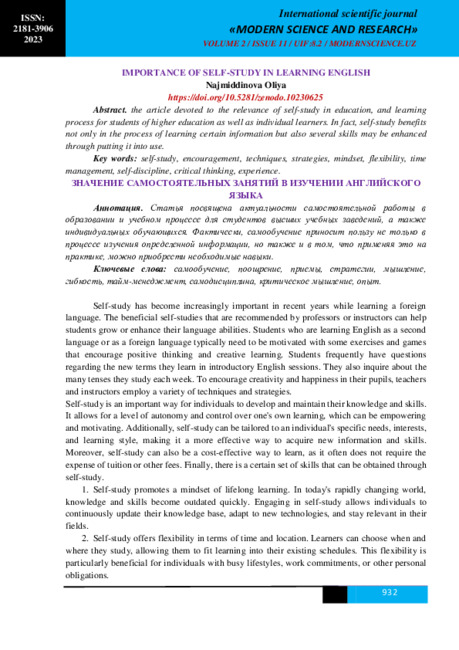
ISSN:
2181-3906
2023
International scientific journal
«MODERN SCIENCE АND RESEARCH»
VOLUME 2 / ISSUE 11 / UIF:8.2 / MODERNSCIENCE.UZ
932
IMPORTANCE OF SELF-STUDY IN LEARNING ENGLISH
Najmiddinova Oliya
https://doi.org/10.5281/zenodo.10230625
Abstract.
the article devoted to the relevance of self-study in education, and learning
process for students of higher education as well as individual learners. In fact, self-study benefits
not only in the process of learning certain information but also several skills may be enhanced
through putting it into use.
Key words:
self-study, encouragement, techniques, strategies, mindset, flexibility, time
management, self-discipline, critical thinking, experience.
ЗНАЧЕНИЕ САМОСТОЯТЕЛЬНЫХ ЗАНЯТИЙ В ИЗУЧЕНИИ АНГЛИЙСКОГО
ЯЗЫКА
Аннотация.
Статья посвящена актуальности самостоятельной работы в
образовании и учебном процессе для студентов высших учебных заведений, а также
индивидуальных обучающихся. Фактически, самообучение приносит пользу не только в
процессе изучения определенной информации, но также и в том, что применяя это на
практике, можно приобрести необходимые навыки.
Ключевые слова:
самообучение, поощрение, приемы, стратегии, мышление,
гибкость, тайм-менеджмент, самодисциплина, критическое мышление, опыт.
Self-study has become increasingly important in recent years while learning a foreign
language. The beneficial self-studies that are recommended by professors or instructors can help
students grow or enhance their language abilities. Students who are learning English as a second
language or as a foreign language typically need to be motivated with some exercises and games
that encourage positive thinking and creative learning. Students frequently have questions
regarding the new terms they learn in introductory English sessions. They also inquire about the
many tenses they study each week. To encourage creativity and happiness in their pupils, teachers
and instructors employ a variety of techniques and strategies.
Self-study is an important way for individuals to develop and maintain their knowledge and skills.
It allows for a level of autonomy and control over one's own learning, which can be empowering
and motivating. Additionally, self-study can be tailored to an individual's specific needs, interests,
and learning style, making it a more effective way to acquire new information and skills.
Moreover, self-study can also be a cost-effective way to learn, as it often does not require the
expense of tuition or other fees. Finally, there is a certain set of skills that can be obtained through
self-study.
1.
Self-study promotes a mindset of lifelong learning. In today's rapidly changing world,
knowledge and skills become outdated quickly. Engaging in self-study allows individuals to
continuously update their knowledge base, adapt to new technologies, and stay relevant in their
fields.
2.
Self-study offers flexibility in terms of time and location. Learners can choose when and
where they study, allowing them to fit learning into their existing schedules. This flexibility is
particularly beneficial for individuals with busy lifestyles, work commitments, or other personal
obligations.

ISSN:
2181-3906
2023
International scientific journal
«MODERN SCIENCE АND RESEARCH»
VOLUME 2 / ISSUE 11 / UIF:8.2 / MODERNSCIENCE.UZ
933
3.
Self-study enables learners to personalize their learning experience. They can choose the
topics, resources, and materials that align with their specific interests and goals. This customization
leads to a deeper level of engagement and motivation, as learners are more likely to be invested in
subjects they are genuinely interested in.
4.
Self-study cultivates self-discipline and time management skills. Since learners are
responsible for their own progress and success, they must develop the ability to stay focused, set
goals, manage their time effectively, and maintain a consistent study routine. These skills are
valuable in various aspects of life beyond education.
5.
Self-study promotes independence and empowers individuals to take control of their own
learning journeys. It encourages critical thinking, problem-solving, and self-reflection, as learners
must actively seek out information, evaluate resources, and assess their own progress. This
autonomy fosters a sense of empowerment and self-confidence.
6.
Self-study can complement formal education. It allows individuals to delve deeper into
subjects of interest, explore additional resources beyond what is covered in formal courses, and
broaden their knowledge beyond the curriculum. Self-study can fill gaps in knowledge, reinforce
understanding, and enhance overall learning outcomes.
7.
Self-study facilitates continuous improvement and personal growth. By regularly engaging
in self-study, individuals can identify areas for improvement, set learning goals, and work towards
self-improvement. It encourages a growth mindset and the pursuit of excellence.
Overall, self-study is a powerful tool for personal development, skill enhancement, and lifelong
learning. It provides individuals with the opportunity to take ownership of their education, adapt
to changing circumstances, and thrive in a knowledge-driven world.
REFERENCES
1.
Deci, E. L., & Ryan, R. M. (1985). Motivation and self-determination in human behavior.
NY: Plenum Publishing Co
2.
Dцrnyei, Z. (1998). Motivation in second and foreign language learning. Language
teaching, 31(3), 117-135
3.
Gardner, R. C., Lalonde, R. N., & Moorcroft, R. (1985). The role of attitudes and
motivation in second language learning: Correlational and experimental considerations.
Language learning, 35(2), 207227.
4.
Gardner, R. C., & Lambert, W. E. (1972). Attitudes and motivation in second-language
learning.





